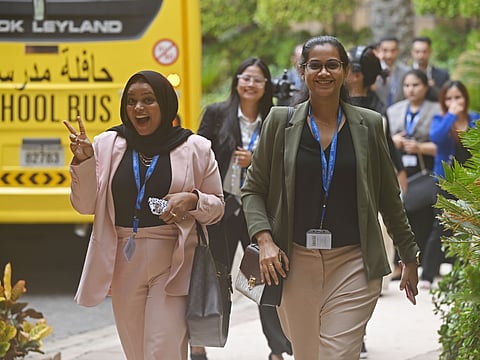GEMS Education forges ahead with 'capital-light’ growth, AI to expand global footprint
Growth in UAE will remain primary focus for next couple of years, says Dino Varkey

Dubai: GEMS Education is pursuing a “capital-light” growth strategy as part of its future expansion, with a focus on its new Global Schools Management (GSM) division.
This move, according to Group CEO Dino Varkey, will allow the UAE-based education giant to accelerate its growth into new international markets, including neighbouring GCC countries and beyond.
Speaking to Gulf News at the sidelines of GEMS’ annual induction programme for its new recruits – GEMS Awareness Day, Varkey said the GSM model is a key part of the group's strategy to diversify its portfolio without the significant capital investment required for building new schools from the ground up.
"It is a part of the growth strategy because, again, the thing about a school management model is it is capital-light, and as a consequence, you can potentially accelerate its growth at a faster pace," he said. The school group confirmed it has recruited 1,700 teachers for this academic year.
New markets, Saudi Arabia
While the UAE remains GEMS's primary focus for the next couple of years, Varkey acknowledged that "adjacent markets in the GCC are going to be important." He confirmed that the company is actively looking at Saudi Arabia, a market that is "too important to ignore" given the kingdom's transformation agenda and emphasis on high-quality education.
GEMS has already opened one school in Saudi Arabia through its GSM model, with a "healthy pipeline" of potential projects across the region, parts of the US, Europe, and Southeast Asia, according to Varkey.
Use of AI in classrooms
Moreover, GEMS Education is embracing artificial intelligence as a "turning point" for the sector. Varkey highlighted AI's "incredibly pervasive impact on the future of education," and said, that the company's ability to lead in this area has never been more critical.
The group is already well ahead of what has been mandated for public schools in the UAE, according to Varkey. GEMS has developed policies for AI use and is transforming its teaching methods and assessments.
Instead of simply evaluating the quality of an answer, the focus is shifting to assessing "the quality of the questions that our students ask." This change in approach is a direct response to the power of AI to generate high-quality answers, making the ability to formulate insightful questions a more valuable skill, the school operators explained.
Group Chief Education Officer, Lisa Crausby OBE, explained that AI is a powerful tool for learning. She cited the example of a student using AI to generate past exam questions and model answers, which she said is about "modelling" and "exam practice" rather than cheating. The goal is to use AI to "free up time for our teachers to be incredibly creative or intuitive" with their students.
While the group acknowledges the risk of "cognitive debt" from over-reliance on AI, it believes the technology can be a vital "catalyst and a bridge" to ensure a minimum quality of teaching, especially given the global teacher shortage of over 70 million.
The officials also said that GEMS is also working to embed AI fluency across all subjects, with a strong emphasis on ethical use and cultural relevance, including advancing AI education in Arabic.
Varkey also highlighted GEMS’s commitment to reflecting the UAE's demographics, citing the example of GEMS American Academy in Abu Dhabi, where the Emirati population sits at nearly 70 per cent, a close reflection of the capital's demographic.
GEMS School for Research and Innovation
The new GEMS School of Research and Innovation, set to open soon, according to the school group officials. The company's belief that there is a strong appetite for premium education in the UAE. Varkey said enrollments are “ahead of our expectations,” confirming that the school is a "signal that the nature of Dubai in the UAE has fundamentally changed" and that the region is ready for a new caliber of education.
Varkey also confirmed that GEMS continues to see strong demand in its schools across its premium and mid-tier institutions. The company's retention rate of 50 per cent is significantly lower than the global benchmark of 25 per cent, which Varkey attributes to its ability to create a supportive “ecosystem” for its staff.
Sign up for the Daily Briefing
Get the latest news and updates straight to your inbox







